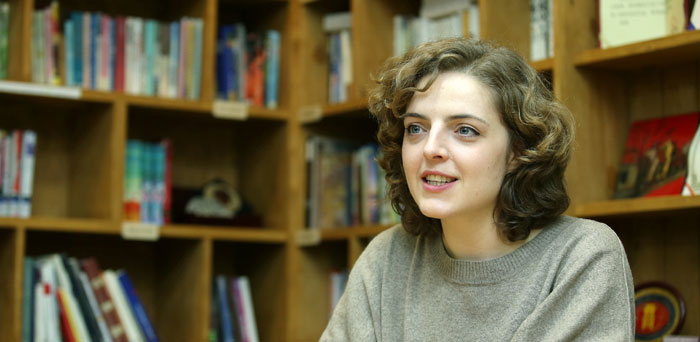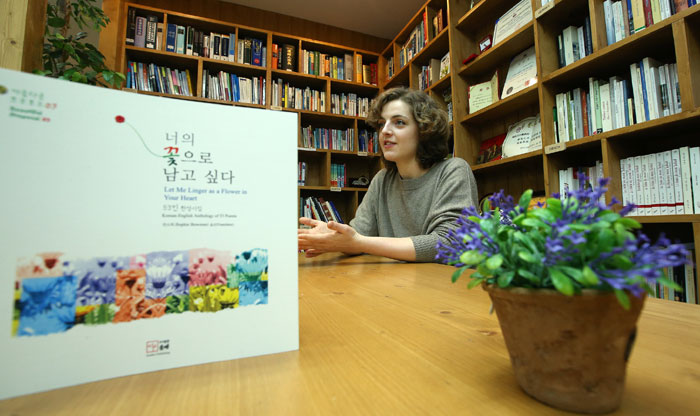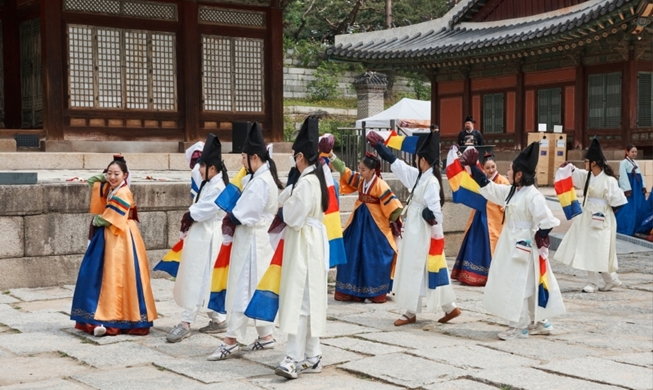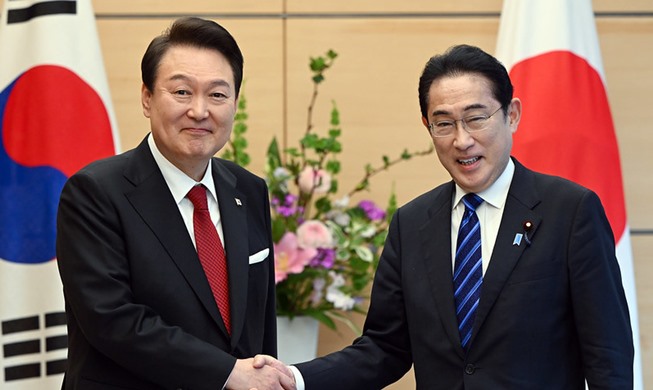-
 Korea.net's 24-hour YouTube channel
Korea.net's 24-hour YouTube channel- NEWS FOCUS
- ABOUT KOREA
- EVENTS
- RESOURCES
- GOVERNMENT
- ABOUT US
“The more you learn Korean, the more interesting it gets. It is not easy to catch and deliver the meaning and the right feeling when dealing with classical literary works, four-character Chinese idioms or unique, folk expressions. Very occasionally, however, I get it right and that makes me happy.”
So said Sophie Bowman with a shy smile.
She is the translator of “Let Me Linger as a Flower in Your Heart,” a recently published collection of more than 50 poems which were written by disabled writers, a collection originally introduced as "Sosdae Munhak" and published by the Korea Disabled Artist Association.

She happened to choose Korean as an exotic language to learn when she was doing her undergraduate degree in anthropology at the School of Oriental and African Studies (SOAS), University of London. Since making that decision, she has studied Korean at the Korean Cultural Centre U.K. and has even visited Korea to study Korean further at Yonsei University's Korean Language Institute, falling ever deeper into the world of Korean studies.
Her interest in Korean language has widened to Korean society and Korean literature. She did her master’s degree in Korean studies as her interest in the country's literature grew. Since 2012, she has been living in Korea, introducing Korean literary works overseas by translating them into English.
Korea.net sat down with her to talk about her life with the Korean language and about Korean literature in general.

Article by Yoon Sojung
Photos: Jeon Han
Korea.net Staff Writers
arete@korea.kr
For more specialized knowledge about Korean literature and translation, please visit the homepage of the Literature Translation Institute of Korea (www.klti.or.kr).
So said Sophie Bowman with a shy smile.
She is the translator of “Let Me Linger as a Flower in Your Heart,” a recently published collection of more than 50 poems which were written by disabled writers, a collection originally introduced as "Sosdae Munhak" and published by the Korea Disabled Artist Association.

Sophie Bowman says she just happened to choose Korean as a second language. Since then, she has developed a passion for Korean and has decided to become a translator, which she said is a, 'lucky coincidence.'
She happened to choose Korean as an exotic language to learn when she was doing her undergraduate degree in anthropology at the School of Oriental and African Studies (SOAS), University of London. Since making that decision, she has studied Korean at the Korean Cultural Centre U.K. and has even visited Korea to study Korean further at Yonsei University's Korean Language Institute, falling ever deeper into the world of Korean studies.
Her interest in Korean language has widened to Korean society and Korean literature. She did her master’s degree in Korean studies as her interest in the country's literature grew. Since 2012, she has been living in Korea, introducing Korean literary works overseas by translating them into English.
Korea.net sat down with her to talk about her life with the Korean language and about Korean literature in general.

Bowman said learning and translating Korean literature is not easy, but that she enjoys it. The book on the left is, “Let Me Linger as a Flower in Your Heart,” which she translated into English.
- What first made you study Korean?
I just thought Korean was an exotic language when I was studying at the SOAS at the University of London. Not many people learned Korean at the time, compared to these days. It was a coincidence, but I thought I was lucky. So it was a lucky coincidence.
- You decided to translate Korean literature after studying Korean language for more than seven years. Why did you take upon such a challenge??
I began to study Korean in 2007. After finishing my M.A., I studied at Yonsei University's Korean Language Institute. I worked at a Korean firm in 2012. I was the only person who could speak English there. While working, I studied Korean a lot and started some translations. Since then, I studied translation more in an intensive course offered by the Literature Translation Institute of Korea.
- Is there anything specific that caused you to become interested in Korean literature or to have an affection for it? If so, what was it?
While doing my undergraduate degree at the University of London, my interest in Korea grew bigger. Most of the books about Korea I read when I was doing my M.A. were written by Westerners. When I read Korean literature, however, I found that Korean books written by Koreans have much more in them than books written by Westerners, as these stories are from those who experienced Korean history as reality. There is a big difference between foreign scholars writing a book about Korea and Korean authors writing about their home.
The first Korean novel I read was “The Guest” by Hwang Seok-young. It was very well-translated and very controversial. After that, I read more books by Korean writers, including Park Wansuh, and was able to understand Korea a bit deeper. At that time, I did not think of being a Korean literature translator. However, a professor who interviewed me for the KLTI program saw the passion in me. Actually, it is not easy to read, understand and deliver the meaning when reading literary works. However, it is strangely exciting. I really enjoy it.
- Is there any reason that you translated “Sosdae Munhak,” a collection of poems written by poets with physical disabilities?
One of my friends knows Professor Bang Gui-hee and we had dinner together one day. After that, Professor Bang proposed the job and sent me two or three poems. One of them was the one by Son Byeong-geol, "I've Got Ten Eyes," which deeply impressed me. Many of us take our eyesight for granted. For some people, however, it’s not taken for granted. I translated a few poems in the beginning and told Bang that I found the job very interesting and that I really enjoyed it. That was the beginning. It took four months to translate a total of 53 poems.
- Among the 53 poems, do you find any to be particularly memorable or special? If so, which ones?
Apart from Son Byeong-geol’s work, I would point out three more. “Suffering and Beauty Live Up On Hilltops” by Kim Yul-do is based on his life in Seoul more than 20 years ago. I had to translated the chicken noise in, “Hey, Chicken,” by Lee Myeong-yun. The process of spring bursting forth is described as the process of giving birth to a flower in “The Camelia’s Labour” by Mun Yeong-yeol. Then there is “Growing a Quince Tree” by Nam In-u. None of the poems in the book talk about the physical disability of the poets. Instead, their poems deal with human emotions, such as joy, sadness, love and so on. As delivering the feelings and emotions into English was important, I concentrated on those issues.
- Your Korean writing ability is quite high, even from a native speaker's point of view. How did you study to such a level? Do you have any secret or special knowhow?
In the case of the translator’s notes in this book, I wrote each of the sentences in both English and Korean. Knowing a language is about communication and also about access to the world in that language, like through people, TV, magazines and so on. It's not about getting a high score on an exam.
In my case, I live in Korea, meet Korean friends and speak Korean mostly. So when I go back home to London, my family and friends often joke that my English sounds strange. I even thought I was stuck in the middle and that it may be a matter of identity. I don’t it's that bad, though. When I open my mouth to go out to buy something or to meet someone, about 90 percent of people are surprised and say, ‘Your Korean is so good.’ I think Koreans need to get used to it as we will see more non-Koreans with good command of Korean.
While translating, when I find difficult parts in classical literature, or four-character Chinese sayings, I mostly rely on dictionaries. One of my friends teaches Chinese characters at high school so I often call her to ask questions. Some expressions, however, have different translations, even among Koreans. I decide which translation or opinion to use among theirs and mine, and very occasionally mine is right, which makes me feel very happy.
Reading Korean literary works in Korean takes longer because I have to look up new words in my dictionary. The same goes with local dialects. Now, I can partially understand the local dialect from Gyeongsang-do (North and South Gyeongsang Provinces). In many cases, however, I ask others. I happened to translate a literary work with a North Korean local dialect, which caused difficulty because there was no dictionary for it.
- Tell us which Korean authors and literary works you like.
I cannot say I read many, but “Who Ate Up All the Shinga?” by Park Wansuh could be one. I read the book in 2010. It was well-translated into English, too, as the book delivers the clear, strong voice of the writer very well. By reading this book, I was able to understand Korean history and society better. So I recommend it to many people around me.
Another book is “The Vegetarian” by Han Kang which was recently translated into English. This book is quite popular these days, even in the U.K. I think this is because the book is very different: edgy and appealing to both non-Koreans and in the translator’s view.
Recently, I translated a short story, “Your Metamorphosis,” by Kim E-hwan. When I first read the book, it took a very short time and was easy to understand. I guess it was because of the author's simple and clear writing style.
Right now, I’ve been translating “A Woman Driving a Goat” by Jon Kyongnin. It is not easy to translate the clear and strong voice of the author in a proper manner and to deal with the unique, strange expressions. I think my English will improve a lot, too, when I finish translating this book.
- Who made your Korean name? Does it have a special meaning?
When I studied at Yonsei's Korean Language Institute in the summer, I had a birthday party with my friends. Some of them who stayed with me late at night strongly suggested that I should have a Korean name. They chose “So-hee” as it sounds similar with my first name. We then made “Ban” as my Korean family name by taking the first and the last letters of my surname. A mother of my friends selected the Chinese characters for my Korean name with good meanings. Then, her grandfather even wrote my Korean name in calligraphy and I was really touched.
- Did you have any difficulties living in Korea? On the contrary, do you find any good sides to living in Korea? If so, what are they?
I’ve been living in Korea since 2011. At first, I received help from my friends a lot. I was always scared when it came to visa or immigration issues because I had never experienced those before. Now, I don’t have many difficulties because I can speak Korean. I do get homesick, as it was very different from my life in London. I missed my family and friends very much.
On the plus side, however, I would say the good side of living in Korea is the convenient public transport and the cheap taxis, a quick delivery system which brings anything the next day after you make an order and the fact that everything is fast. I guess these days I am used to such a lifestyle.
- I heard you love hiking. Which parks do you most often visit and why do you enjoy going there?
I’ve been to Jirisan Mountain eight or 10 times. I could go up to the top or somewhere in the middle. I go there via Cheongju or Namwon. I go to Bukhansan Mountain more often, but Jirisan is my favorite. It is easy to climb, in the case of Nogodan, as it takes about an hour to get there. It is high and has a great view.
- You’ve learned and experienced Korea and Korean society while living here, and through its literature. What are the 'Korean people' and 'Korean society' like, in your view?
It is hard to say in general because every individual is different. However, in my view, city life makes people less friendly. When outside Seoul, I can spot many people who are kind and love to help each other and share food. For example, food-sharing can be seen more often outside the city than in the cities.
- I appreciate your affection for Korean literature. Literature from Britain, your home country, has had a considerable influence on Korean literature. Please introduce some novels or poems by British authors you would like to recommend to Korean readers.
I am not sure about contemporary writers, but I like poems. I would recommend poets like Seamus Heany, who won the Nobel Prize, and Philip Larkin. I actually love science fiction. My favorite is "The Hitchhiker's Guide to the Galaxy" by Douglas Adams. This book is very well-known in the science fiction world. It is translated into Korean, but I wish I could translate it myself in the future, if possible.
- Do you have any future plans or wishes in regard to Korean literature?
Starting this March, I will study at the Department of Korean Literature at Ewha Woman’s University for two years. My goal is to read as many works of Korean literature and write in Korean as much as possible. My major will be Criticism in Contemporary Korean Literature, focusing on understanding the text, as it is also important in translation. My main goal is to improve my Korean in terms of reading.
Article by Yoon Sojung
Photos: Jeon Han
Korea.net Staff Writers
arete@korea.kr
For more specialized knowledge about Korean literature and translation, please visit the homepage of the Literature Translation Institute of Korea (www.klti.or.kr).
Most popular
- China warmly welcomes first Korea-born giant panda Fu Bao
- First hearing-impaired K-pop act hopes for 'barrier-free world'
- Novelist Hwang's 'Mater 2-10' shortlisted for Int'l Booker Prize
- Expats could account for 7% of population in 20 years: report
- Nat'l Fire Agency picks 137 elite staff for deployment abroad













